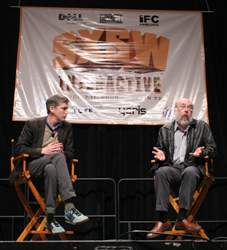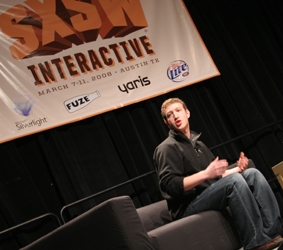The geeks shall inherit the Earth
SXSW NEWS: Professors from MIT and social networking billionaires are preaching new digital media futures to the converted this week at the South By Southwest (SXSW) Interactive Festival in Texas. It’s a shame the television industry isn’t in town to hear the sermons, writes David Jenkinson.
Austin is the capital of Texas, just in case you thought Houston or Dallas were more important. The town’s motto is ‘Keep Austin Weird,’ and this week it’s doing that nicely.
SXSW is one of the world’s most prolific music festivals, attracting the latest and greatest names in the business. But giving the thrash metal mosh-up a run for its money is a film, documentary and interactive festival that runs alongside, mashing things up in its own unique way.
New devices, new platforms, new content and new opportunities are high on the agenda in the hyperspeed world of SXSW. Just one thing seems to be missing: the television business.
It’s strange there aren’t more people here from television, if just to see what’s rising up in the homelands of digital media that may challenge traditional business models in the comfortable world of linear entertainment.
But web designers, media strategists, interactive consultants, advertisers, user experience pioneers, and just about every other digital incarnation abounds. And they smell victory. Sessions are packed from dawn ’til dusk with the geek crowd – laptops on blog – digesting every last syllable of rich-media hyperbole.
The main consequential theme of SXSW Interactive is that new forms of digital media are now having a significant impact on the mainstream and starting to have a major impact on world media and entertainment as media consumption changes.
Nowhere is that more apparent than in the keynote sessions.

 Henry Jenkins (pictured right), media guru and professor at MIT’s comparative media studies programme, set the tone with an opening discussion that championed the fact new media is developing a new global collective consciousness that is in opposition to what went before. As such it’s important for all areas of the business.
Henry Jenkins (pictured right), media guru and professor at MIT’s comparative media studies programme, set the tone with an opening discussion that championed the fact new media is developing a new global collective consciousness that is in opposition to what went before. As such it’s important for all areas of the business.
For Jenkins, the world is on the edge of a media revolution, driven by emerging media phenomena like social networks and web-driven interactive content. “As we move to a collective intelligence, the trend is for people to process knowledge together and pool resources,” he said. “That is changing the nature of society from one where people were expected to know everything to one that demands a different approach. With so much information available nobody can know everything anymore, but they can all know a bit of everything and process that knowledge together.”
Jenkins noted the difference between a traditional encyclopaedia and the collaborative Wickipedia as an example of how the future will be defined. “No individual should be allowed to write an encyclopaedia. The process of Wickipedia is much more satisfactory in the end, because definitions change and can be shared and develop,” he said. “We work as teams today. We pool knowledge and access it on a need-to-know basis.”
The consequence of this trend with regard to television programming is, Jenkins suggests, that we are witnessing the end of top-down creativity and the arrival of ideas that come from the bottom up.
“The increasing success of new forms of TV production may be determining the future of content,” he said. “A few years ago the general feeling was formats like Fear Factor were going to be the future. Now there has been a slow but sure trend towards a renaissance in television with Lost and The Wire.
Jenkins went on to suggest that the off-TV extensions of Lost have defined a new way of interacting with television content for fans. “The Wire has created a phenomenon of layered complexity season by season, which really allows you to get inside the world of the characters. But it all takes place on the television. Much of the phenomenon of Lost takes place online through the fan communities that grow up around the show.
“For example, at the start of season two the map that was on screen for a few seconds was scanned, uploaded on websites and discussed in forums to an unbelievable extent as fans tried to decode its meaning. It took things to a whole new level,” he continued.
“The Wire may be the last gasp of an old-style television that is pushed to its ultimate limit. It’s Hill Street on steroids, but Lost may be the first of a fresh style of content that pushes us in a new direction in terms of what it means to interact with a television series.”
The common theme is the role played in content by the audience. As the blogging delegates agreed, participation in content is an essential part of the mix in 2008.

 Facebook founder and the world’s youngest-ever self-made billionaire Mark Zuckerberg (left) raised the rabble on Sunday with his ongoing push to change the way people communicate.
Facebook founder and the world’s youngest-ever self-made billionaire Mark Zuckerberg (left) raised the rabble on Sunday with his ongoing push to change the way people communicate.
Zuckerberg substantiated the notion that taking control was key for any audience or community, and that helping people communicate better was the core mission for Facebook. The fact that more than 60% of American teenagers are now active producers of media through social networking sites is a key driver in the Facebook development strategy, as viewer becomes producer.
He also acknowledged that as the site develops it will provide more open-source development for producers and content owners to create relationships with members within the community.
“We are also going to build out the email functionality of the site,” he said. “It is interesting how this has evolved. We weren’t planning on being an email competitor at the start. A lot of the utilities we offer are meant to be very simple. Like ‘poke’ – a binary thing – poke – done. The messaging was designed to be simple too. But it seems people are using it in an increasingly complex way, and in ways akin to traditional email. In the near future we will need to address that.”
A lot of what is said here will likely evaporate, like so many ideas that were too hot the last time round. But what were once niche obsessions for media geeks are now starting to have a bearing on the overall media landscape. Perhaps it’s time to add SXSW to your business calendar, before the geeks get too big for their boots.













.jpg)




























